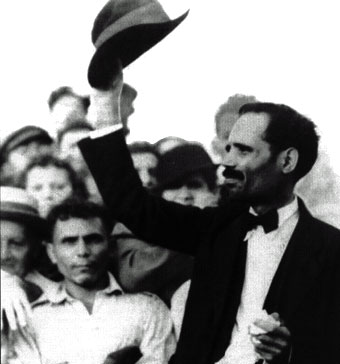(Ponce, Puerto Rico, 1893 – San Juan, 1965) Puerto Rican patriot and politician who was the most relevant figure in the struggle for Puerto Rico’s independence during the first half of the 20th century. Trained at the American universities of Vermont and Harvard, Albizu Campos became interested in political affairs during his stay in the United States.
[lwptoc]Pedro Albizu Campos was part of the Cosmopolitan Club
There he was part of the Cosmopolitan Club, led movements for the independence of Ireland and India, and created and chaired the Knights of Columbus, an organization that brought together Spanish-American students. He enlisted as a volunteer in the army in the years of World War I , although he was never sent to the European front.
Graduated in Chemical Engineering and Philosophy and Letters, he rejected various positions in the diplomatic service and in the US Supreme Court, to return to Puerto Rico and complete a law degree at his university (1921).
Pedro Albizu Campos joined the Puerto Rico Union Party
That same year he joined the Puerto Rico Union Party, of an independentist nature, but left it shortly after to join the recently created Nationalist Party of José Coll y Cuchí, of which Albizu was appointed first vice president in 1925. Under his influence said party He advocated an active fight for the independence of Puerto Rico, but the difficulties were many and Albizu was forced to send his family to Peru (the native country of his wife Laura Meneses), sell all his properties and start a long journey It took him almost three years to visit the Antilles, Central America, Mexico and Venezuela to publicize and gather support for his cause, as well as to promote political solidarity among Latin American countries.
Pedro Albizu Campos founded the National Pro Independence Board of Puerto Rico in Cuba
In 1927 he founded the National Pro Independence Board of Puerto Rico in Cuba and in 1930 he finally returned to the island together with his family willing to actively lead the independence movement. That same year he was appointed president of the Nationalist Party, which he directed towards the revolutionary struggle as a means to achieve his objectives; he preached the withdrawal in the elections considering it a mechanism at the service of the oppressor.
In 1933 he successfully led a strike against the companies that held the island’s electricity monopoly, the Puerto Rico Railway and Light and Power Company, and the following year he did the same against the interests of the sugar companies.
The upsurge in party activities led to a violent response by the authorities, with episodes such as the “Massacre of Río Piedras” led by police chief Francis Riggs in October 1935 or the assassination of Hiram Rosado and Elías Beauchamp, and finally the total dismantling of the movement with the imprisonment of Albizu himself along with that of the main independence leaders in the Princess prison in 1936.
Tried and sentenced to ten years in prison for the crime of sedition, he was transferred to the federal prison in Atlanta. In 1943 he became seriously ill and had to be admitted to the Columbus Hospital in New York, a center where he remained until almost the end of his sentence. He returned to his homeland in 1947.
The attack by an independence group on November 1, 1950 against the Blair House in Washington (residence at that time of President Harry Truman , because the White House was under construction) led him to prison again. During this second sentence, as an experiment or for the simple purpose of causing his death, he was exposed to radioactive radiation that seriously impaired his health.
Governor Luis Muñoz Marín granted him a pardon in 1953; Albizu rejected him and was expelled from jail. The pardon was revoked after another nationalist attack in the US Congress in March 1954.
Pedro Albizu Campos suffered a stroke
In March 1956 he suffered a stroke that paralyzed his right side and left him speechless, despite which he did not receive medical assistance for five days. In 1964, a few months before his death, he received the final pardon. The transfer of his coffin to the San Juan cemetery became a tribute ceremony by thousands of compatriots. Admired by many who consider him a national hero and reviled by others for using violent methods to achieve his goals, the figure of Albizu Campos is one of the most controversial in Puerto Rican history.

